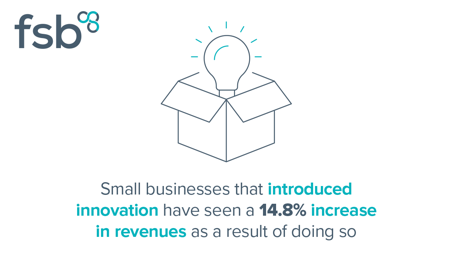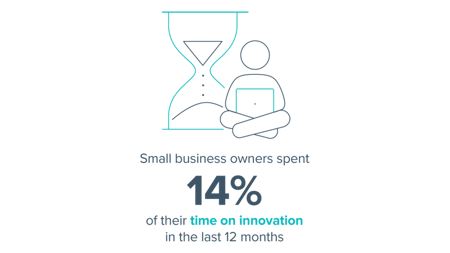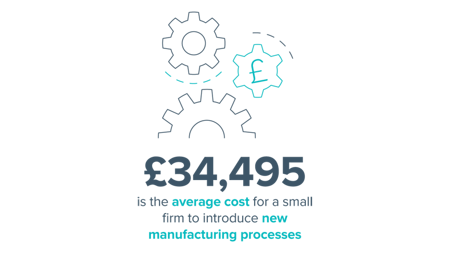Foreword
Start-ups and small businesses are quick to move with new ideas that change the economy
From the small hospitality business that adopted QR code menus to the small window blind manufacturer that re-purposed its business by producing 22,000 face masks per day, the Covid-19 pandemic spurred a growing number of small businesses to adopt new technologies and innovate. Start-ups and small businesses are quick to move with new ideas that change the economy, often up against large incumbents; now we need a set of new policies and decisions that can take this to the next level. This report presents a raft of ideas for Government Departments, regulators, public agencies, and all those with a stake in tech adoption and innovation, and how they can drive economic growth.
Too often, the word innovation is used in a vague way or it means different things to different people. Much like ‘productivity’, innovation now risks becoming a former buzzword or catchphrase rather than a driver of coherent, focused public policy. In this report, we define innovation as the development and use of new ideas and technologies to turn around the five-year period of lost economic growth that we are currently experiencing.
There is a misconception that innovation always equates to invention and is only confined to the tech industry. Developing new products is an important part of the innovation landscape. Yet it is only one part and we must take a broader look to capture the economic potential - value needs to also be placed on firms improving their products, successfully using technology or modernising their manufacturing processes.
Crucially, this does not necessarily have to take place in a lab – local high streets drive changes in how to run their businesses, too. For example, the local hair salon increases customer engagement by providing virtual hair and beauty consultations; the small manufacturer which can now bottle more drinks than ever before thanks to its automatic bottling machine; or the small firm that applies AI to adopts new marketing materials, customer emails or how it chases up late invoices.
While small businesses are agile, innovative and resilient by nature, there are undeniable barriers that are holding them back from tech adoption and innovation. This report outlines the challenges faced by small business owners looking to grow their business or work more efficiently, ranging from the lack of capital to the lack of understanding of implementation. This report also finds that disabled and female entrepreneurs are more likely to face avoidable barriers, including access to finance, highlighting the need to promote an inclusive approach.
It is hardly news that small businesses, compared to big corporates, have much fewer resources and lower margins. But, in the last few years, the level of government innovation funding that goes to SMEs is relatively low, despite 99% of our total business population being small businesses. It is important to recognise that many of today’s tech giants started out as small businesses, so supporting the latter should be considered as an investment rather than an expenditure. That’s why FSB has consistently encouraged the Government to empower small businesses to be more digital-savvy, sustainable and efficient by ensuring the relevant funding to the firms in need.
Funding alone is not sufficient to build the right infrastructure to encourage small businesses to invest in tech adoption and innovation. It also requires policymakers to have a broader understanding– one that goes beyond fixating on making the UK the next Silicon Valley and picking winners.
To move our society from low or no economic growth, we need to see more businesses free and empowered to experiment and try new ways of working, as well as a more ambitious pathway for start-ups to shake up the marketplace and change the world. To achieve this, there needs to be an inclusive, entrepreneur-led approach that incentivises small business owners to take risks and develop new solutions from the bottom up, not top-down. We hope this report would provide much food for thought and help pave the way to a new, growing, economy.

Tina McKenzie
FSB Policy and Advocacy Chair
Key findings








Executive Summary
Innovation, the development and use of new ideas and technologies, is a crucial element in turning around poor productivity. For the UK to truly harness the economic benefits, the policy area needs to be considered more broadly, beyond only the development of brand-new products. The UK’s current drive to become the next Silicon Valley must not come at the expense of an entrepreneur-led approach, with little focus on small businesses successfully adopting new technologies or ideas as well as changing their processes. This report is split into seven parts:
Different types of innovation
The first chapter explores the different types of innovation that small businesses have conducted in the past three years. The report categorises innovation into four different categories: • Developing new products
- Significantly improving products
- Introducing new or significantly improved manufacturing processes
- Introducing new or significantly improved internal and/or customer facing processes
Our evidence suggests certain types of small firms are more likely to introduce these types of changes. These include small firms that have been in business for four years or less, those with a turnover of more than £1million a year and those with female business owners.
The principal driver behind small business innovation is to grow their turnover followed by diversifying and increasing their resilience. Small businesses that have improved their processes are more likely to be motivated to do so to reduce cost or to automate. Our evidence suggests the development of new to market products brings about the most revenue gain. However, new to market innovation tends to be more time-consuming, expensive and is riskier than other types of innovation.
Barriers and incentives
The second chapter evaluates the barriers facing small firms wanting to innovate and considers what could encourage more of this activity. While time and cost are the primary factors, there is clear evidence that additional non-financial support and better information, advice and guidance would enable more small businesses to significantly improve their internal and customer facing processes.
Research and Development
Encouraging R&D activity and enabling small businesses focused on science and technology is highly important. R&D tax credits have been very successful at boosting this activity amongst SMEs. Government cuts to R&D tax relief, even for R&D intensive firms, are self-defeating, especially when countries such as France and the US are going in the opposite direction. While investing more public money into R&D is sensible, we need to ensure that government grants are well targeted as well as placing more emphasis on encouraging synergy between businesses to develop new ideas.
Intellectual Property
There is a continuing lack of engagement in the Intellectual Property (IP) regime from small businesses. Even those SMEs which developed new products in the last three years are more likely to see IP as a barrier to innovation than to have ever successfully applied for a patent. We should encourage more SMEs to engage with the IP regime. However, especially with developments in artificial intelligence, there are broader questions about whether the current IP regime inherently disadvantages small businesses.
Technology adoption
The central challenge with encouraging firms to adopt technology is enabling them to use technology and data to improve their processes. To enable successful tech adoption amongst small businesses, it is less important that they all have an intimate knowledge of technology. It is more important that they are able to review their processes and understand how technology could save them time and work more efficiently.
Green adoption
Small businesses recognise the importance of minimising their impact on the environment, but they often lack the time, expertise, and resources to do so. While small businesses do recognise the importance of getting to net zero, it is not always their top priority and finding finance to make changes is difficult. Enabling small businesses to change their processes requires a strong business support offer.
Adopting innovation and business support
Small and micro businesses want business support advice delivered from those with private sector experience and are based locally. They are more receptive to those who they trust, understand what their business requires, and communicate in a manner that is understandable and relatable. This offer, particularly in England, is patchy at best and a consistent, well-funded business support approach, which focuses on tech adoption and innovation could really boost the productivity of small businesses.
Download the full report




